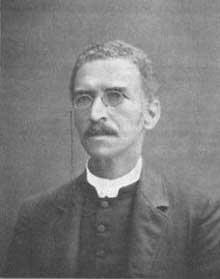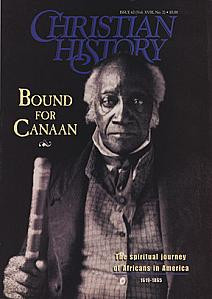FRANCIS GRIMKÉ, EX-SLAVE, BECAME A LEADING PASTOR IN DC

[Above: Francis James Grimké —Unknown photographer - Twentieth Century Negro Literature http://www.gutenberg.org/etext/18772 Wikimedia File:Francis James Grimke.jpg]
FRANCIS J. GRIMKÉ was the son of Henry Grimké, a leading white man in South Carolina, and Nancy Weston, a slave woman. The relationship developed after Henry’s wife died. Henry himself died when Francis was five years old, making Francis and his sibling Archibald free wards of Montague, their uncle. However, Montague ignored this and enslaved Francis and his brother. Francis ran away, served a Confederate officer, was captured and jailed, then sold to another Confederate officer.
After the war, Francis and Archibald tried various jobs before their acceptance at Lincoln University in Oxford, Pennsylvania. Both flourished in school. Francis was class valedictorian at his 1870 graduation, and afterward taught mathematics and served as the school’s financial agent. Archibald became a notable speaker. Both Archibald and Francis enrolled in law school at Harvard, but Francis did not find law to his taste, and dropped out to attend Princeton Theological Seminary where he trained for the Presbyterian ministry.
On this day, 7 July 1878, Francis J. Grimké was ordained a Presbyterian minister. He married Charlotte Forten the same year.
The people of the 15th Street Presbyterian Church in Washington, DC, called him to be their pastor. Many whites, including Congressmen, came to hear him speak. He emphasized the virtues of honesty, hard work, and thrift but was also forthright in his denunciation of sin and racism. “If Jesus Christ should come in the guise of a black man, [racists] would not listen to him, they would not permit him to occupy their pulpits,” he said. His well-organized sermon “The Negro and His Citizenship” compared African American citizenship rights with the rights Paul claimed as a Roman citizen.
Grimké’s writings and sermons were saturated with references to Christ. This was because he believed that in knowing Jesus lives are transformed:
The secret of the spiritual life is to keep in close touch with Jesus Christ through the indwelling of the Holy Spirit. It is close personal touch with Jesus that makes alive, that gives power.
“In our character and life the evidence of our relation to Jesus Christ ought to be clearly seen,” Grimké said on one occasion; and on another, “Every time we get up to preach, we have the opportunity of magnifying ourselves, or of magnifying Jesus Christ—of calling attention to ourselves or to him.”
Grimké practiced what he preached. When he left the DC church, its people prepared a memorial for him that included this tribute:
Remembering his work and the good deeds left behind him, and how he has, by the measure of unselfish devotion taught us, by precept and example, the way to be lifted up and strengthened, we make this feeble attempt to pay reverential respects, and extend the meed [reward] and honor of praise and true regard of him whom we shall ever know as our friend and benefactor.
After Grimké pastored in Jacksonville, Florida, the editor of Southern Leaderwrote, “[Grimké's] deep piety, correct life, and earnest devotion to his work, have won for him universal respect and love.”
Grimké was active in several African American organizations. He also joined in organizing the American Negro Academy in 1897 and served as its treasurer for twenty-two years. He died in 1937, twenty years after his wife Charlotte.
—Dan Graves
----- ----- -----
For more stories of African-Americans before emancipation, consult Christian History #62, Bound for Canaan






